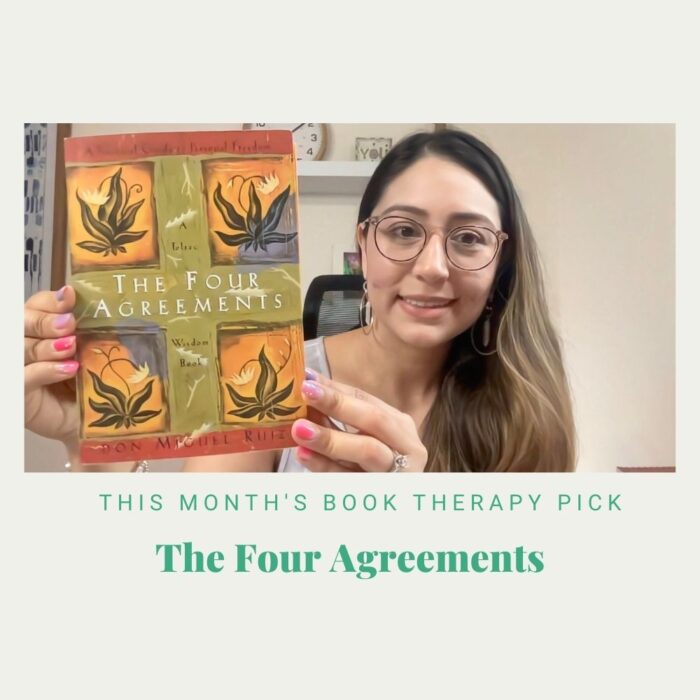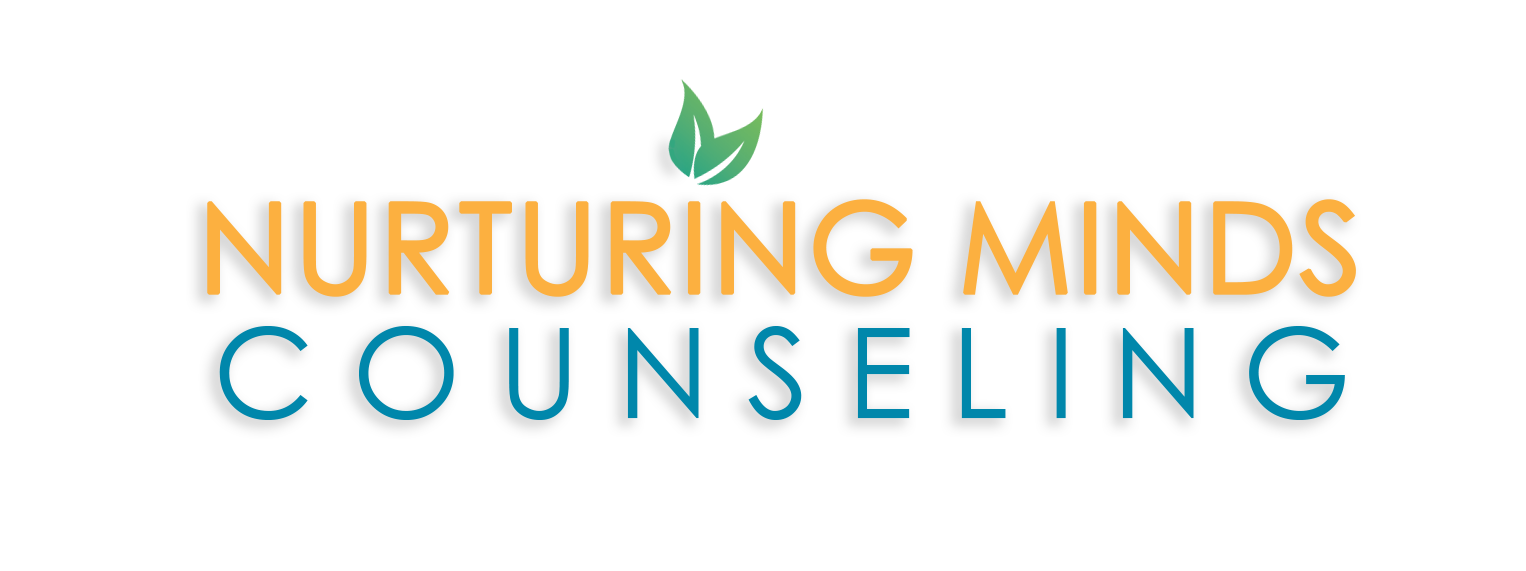Book Therapy: The Four Agreements

Are you looking for a book with tons of wisdom that might shift the way you look at the world? Then this month’s book therapy pick is for you! It’s The Four Agreements: A Practical Guide to Personal Freedom (A Toltec Wisdom Book) by Don Miguel Ruiz. You can also enter to win a copy of the book. Scroll to the bottom. *Only open to USA Residents
Table of Contents
Watch the video on The Four Agreements
Read blog on The Four Agreements
Like I said, this month’s book therapy pick is The Four Agreements: A Practical Guide to Personal Freedom (A Toltec Wisdom Book) by Don Miguel Ruiz.

I picked up this book years ago, but when I tried to read it, I just couldn’t get through the first couple of pages because it didn’t resonate with me. However, many people and colleagues, that I respect and trust, recommended trying this book again so I did. This time it was different, and maybe it was due to timing or where I’m at in my life now, but when I picked up this book again, I started to get it and understand the concepts that he discusses.
The Four Agreements Summary
The book is broken down into seven chapters and Don Miguel Ruiz is taking wisdom from what he calls the Toltec people. Per Ruiz, Toltec is not a nation or a race, but in fact the Toltec were scientists and artists who formed a society to explore and conserve the spiritual knowledge and practices of the ancient ones. Based on the description of who the Toltecs are, this book has a lot of spiritual content, beliefs, and it has a philosophical feel. As you read through it, it’s similar to The Art of Communication Book that I recommended a couple books ago. If you like those types of books, then this might be up your alley. If you don’t like more spiritual content, then this might not be the book for you.

I will say that I always take everything with a grain of salt . I try to determine what’s applicable and apply what I think works for my life. Clearly, if there are things that I don’t agree with, then I just leave it. I encourage you to have that perspective as you read this book. Some of the book has stories, and with a lot of spiritual books you’ll see that even how they explain the concepts might feel a little abstract or confusing. I feel like he does give a lot of good examples so you c an understand the concept that he’s discussing.
Insight 1: Be Impeccable with You Words
If you are a high achiever, type A personality or perfectionist, you may be familiar with productivity anxiety. Here are several common signs of productivity anxiety that you He talks about the poison of words or the power of words. He describes it as when you say something cruel or harsh to someone, you put a spell of black magic. Again, if you’re not spiritual, just take that with a grain of salt. Ultimately, I think what he’s saying is be conscious with what you say and what you put out into the world because, at the end of the day, words have energy and can have an impact on other people. Your role is to be impeccable with your words, and I know that sounds super simple, but it’s hard.experience.
Think about how often you say something when you’re in a place of hurt or anger just to hurt someone back, or you say things thoughtlessly. How often do parents say things without thought to their kids? It is helpful to start to take ownership of how you speak, what you share, and what you put out into the world.

Ironically, as I was reading this book, I first hand experienced being able to apply this insight to my life. I was having a conversation with my fiancé, and I was about to give a sharp response but I stopped myself and asked whether that’s being impeccable with my words. And I realized it wasn’t so I did not respond as I initially would have, which I could tell had a positive impact on that interaction. This is where the magic is for me, in taking these agreements and applying it to your life.
Insight 2: Don’t Take Anything Personally
The First Agreement was about you focusing on what you put into the world, the energy, the words that you’re saying to others, and how you’re showing up. The second one is about removing some of the power that other people can have over you. Shift your mindset so that the words that others use towards you aren’t taken personally.
There’s a quote in the book that I liked about personal importance, or how taking things personally, is the maximum expression of selfishness because we make the assumption that everything is about me. I think we all do that, so I definitely want to normalize and acknowledge how often we are in our own heads focusing on our needs and interpreting that everything is about us. The truth is that that’s not the case and, even if it is, not taking it so personally so that it doesn’t have such an impact in your life.

I think that it’s important to remember that when someone does or says something to you that might be hurtful, or uses words that are hurtful, acknowledging it’s about their own unresolved stuff. I’m not saying there isn’t room for receiving helpful feedback but when someone uses their words in a way to hurt you even if what they are saying rings true, they’re manner of expressing it is not. And if they do express it that way, it could be about their frustration and anger towards you and the helpful message might get lost in the shuffle.
And acknowledge that when someone says something hurtful, it’s just more of a representation of them than of you. We’re going to be in constant relationships with other people, so try to recognize when you are taking something personally. You’re still going to have a range of feelings, but acknowledge that and create a little bit more distance and realize that it’s not about me, then it’s going to shift the way you show up.
Insight 3: Don’t Make Assumptions
This goes back to being in relationships with others and acknowledging how often you’re making assumptions about other people’s behaviors. This might go back to assuming that everything is personal and making it about you. Think about how often those assumptions are getting in the way and how it’s easier to make assumptions rather than to have the courage to ask and clarify. It can take a bit of vulnerability to ask rather than just assuming and then acting as if that assumption is true.

The author gives an example of being in a relationship. If you just assume that your partner is going to know what you need, and then when they don’t meet that need because you haven’t said it, then you feel hurt and bothered. If you just didn’t assume, and you expressed what you needed, things could be much easier and different. I do see that a lot, and I’m sure I’ve been guilty of it many times where I just assume that my partner will know and then I get angry or hurt that he doesn’t. I could have just clarified that from the beginning.
There’s another quote about how everyone has the right to answer yes or no when you ask for clarification, but you always have the right to ask. I love that because I think how many times we do not ask or question just because we don’t want t to bother someone. The way to stop making assumptions is to ask questions and being comfortable with doing that.
Insight 4: Always Do Your Best
This sounds so much easier said than done. He talks about applying this to the three previous agreements. At the end of the day, you’re going to make mistakes and you’re going to mess up, but that’s okay. He states that the only thing you can do is show up as your best and sometimes and that will look different every single day in every single situation depending on your energy and what’s going on in your life. If you can be honest with yourself, and when you look at your mirror and ask if you did your best in that situation, that’s all you can do.

He talks about how in the mind there’s the judge and the victim. You’ll have to read the book to learn more about that, but when the judge starts to show up and you question whether you did something right or wrong, if you can sit in that seat of confidence and say that I did my best then that should be enough.
He’s also applying this sentiment to the three previous agreements because there’s no sense in seeking perfection. I like this part because it’s also taking some of these agreements from just these nice concepts that we’re thinking about and then applying them to action. I do appreciate that he did put an emphasis on at the end of the day your life is all about the actions that you do. You can think about these things, and they can sound pretty on paper, but if you’re not applying them in your life, then what’s the point?
Which agreement resonated with you and stood out to you the most of one, two, three, or four? For me, I’m not sure! Agreement one, be impeccable with your words, probably resonated most with me. I’ve already notice myself applying it. But also just do your best because if you can just do your best, that’s all we can ask.
I will say that there’s certain concepts, sentences, or the way some things were presented that I don’t fully agree with, but I think that’s the same with all books. I do think that the book overall had many nuggets of wisdom and he ends the book with some prayers you can practice.
If you enjoyed this content, I encourage you to subscribe to my email newsletter to get the latest tips to improve your mental health, more book recommendations, and other resources on your self-growth journey. Don’t forget to scroll down and enter to win a free copy of the book! And as always, I hope you continue nurturing your mind, body, and soul, whatever that looks like for you.
